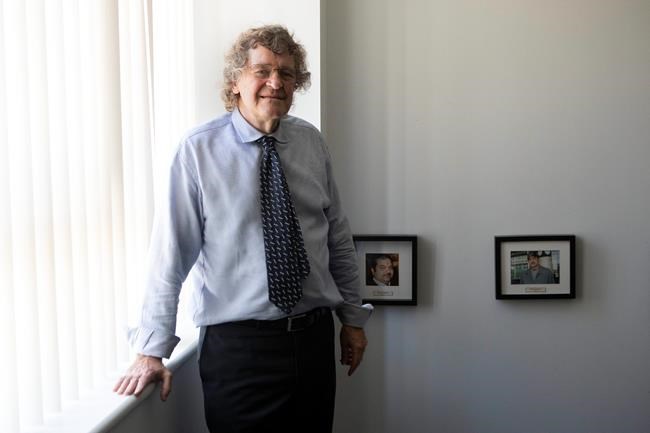Experts shine light on wrongful convictions
Advertisement
Read this article for free:
or
Already have an account? Log in here »
To continue reading, please subscribe:
Monthly Digital Subscription
$0 for the first 4 weeks*
- Enjoy unlimited reading on winnipegfreepress.com
- Read the E-Edition, our digital replica newspaper
- Access News Break, our award-winning app
- Play interactive puzzles
*No charge for 4 weeks then price increases to the regular rate of $19.00 plus GST every four weeks. Offer available to new and qualified returning subscribers only. Cancel any time.
Monthly Digital Subscription
$4.75/week*
- Enjoy unlimited reading on winnipegfreepress.com
- Read the E-Edition, our digital replica newspaper
- Access News Break, our award-winning app
- Play interactive puzzles
*Billed as $19 plus GST every four weeks. Cancel any time.
To continue reading, please subscribe:
Add Free Press access to your Brandon Sun subscription for only an additional
$1 for the first 4 weeks*
*Your next subscription payment will increase by $1.00 and you will be charged $16.99 plus GST for four weeks. After four weeks, your payment will increase to $23.99 plus GST every four weeks.
Read unlimited articles for free today:
or
Already have an account? Log in here »
Hey there, time traveller!
This article was published 28/11/2023 (764 days ago), so information in it may no longer be current.
Wrongful conviction cases in North America, and the systemic racism that underpins many of them, was the subject of a panel discussion at the Canadian Museum for Human Rights on Tuesday.
“Until we make people aware of what is going on, it’s going to continue to be the same,” said Greg Banks, one of the five panelists. “You’ve got to have people like us — all of us — that are fighting the system.”
Banks, who spoke remotely via a livestream, was tortured by Chicago police and coerced into confessing to a slaying he did not commit when he was 20 years old. He spent 24 years in prison before being exonerated, much like many other Black men in Chicago who are now able to access a reparations fund to compensate police torture victims, he told the 100-person crowd.
DANIEL CRUMP / WINNIPEG FREE PRESS FILES
In Manitoba, the spotlight was shone on wrongful convictions in July when two Indigenous men were exonerated following a 50-year-old murder conviction. The two men, Brian Anderson and Allan (A.J.) Woodhouse, were in attendance at the panel talk. Anderson attended in person with his family and Woodhouse watched remotely on the livestream. Anderson and Woodhouse were beaten by Winnipeg police and forced to sign false confessions in the 1973 slaying of Ting Fong Chan, a father, restaurant worker and Chinese immigrant.
They both spent years in prison but always maintained their innocence. (An application for a federal review into the convictions of two other men convicted in the same case — Clarence Woodhouse and Russell Woodhouse — is ongoing. Russell died in 2011 and his application was submitted posthumously.) Their case was prosecuted by then-star Crown attorney George Dangerfield, who now has more wrongful convictions tied to his name than any other prosecutor in Canada.
“Racism in the justice system is not the anomaly… This is not new, this is not right.”–Shayna Plaut
The Tuesday talk focused on racist attitudes that existed — and exist — in judicial systems in Canada and the United States.
“This injustice is normalized because people are not seen as fully human,” said Shayna Plaut, the director of research and development at the museum, who helped organize the event. “Racism in the justice system is not the anomaly… This is not new, this is not right.”
MIKAELA MACKENZIE / WINNIPEG FREE PRESS FILES Allan (A.J.) Woodhouse (left) and Brian Anderson in July 2023 after leaving the Law Courts as free men.
Plaut said wrongful conviction stories must be shared “in the hopes that collectively, we can build something new.”
James Lockyer, a founding director of Innocence Canada, which advocates for wrongfully convicted people, and a lawyer who represented Anderson and Woodhouse in court, read a line from the judge’s sentencing decision in their decades-old conviction.
“This is not a jungle that we live in, it is not a wild land… we are not still taking it from wild people,” Lockyer read.
“Can you imagine?” he said. “That’s a judge.”
Amanda Carling, a lawyer and Métis woman who grew up in Winnipeg, recalled her experience when she shadowed a judge in court in Winnipeg.

“Every single child that came before that court was Native,” she said. “These were kids that could have been my cousins.”
In her law career, she was drawn to cases involving miscarriages of justice. She soon realized many of the people eventually exonerated were white men, leading her to wonder how many Indigenous people were similarly wrongly incarcerated but not able to get justice.
A 2022 report from the Office of the Correctional Investigator of Canada shows Indigenous people make up 32 per cent of the prison population, despite representing only five per cent of the total population in Canada. Indigenous women make up 50 per cent of the incarcerated women population in Canada.
Carling, who is now CEO of the BC First Nations Justice Council, which works to restore self-determination in the justice system for BC First Nations, said a lot has changed regarding acknowledging systemic racism in courts in the past decade. But there is still much work to be done when it comes to righting past wrongs, and specifically, exonerating people who’ve been wrongfully convicted.
“I want to know who else needs to be on that list,” she said.
katrina.clarke@freepress.mb.ca

Katrina Clarke
Investigative reporter
Katrina Clarke is an investigative reporter at the Winnipeg Free Press. Katrina holds a bachelor’s degree in politics from Queen’s University and a master’s degree in journalism from Western University. She has worked at newspapers across Canada, including the National Post and the Toronto Star. She joined the Free Press in 2022. Read more about Katrina.
Every piece of reporting Katrina produces is reviewed by an editing team before it is posted online or published in print — part of the Free Press‘s tradition, since 1872, of producing reliable independent journalism. Read more about Free Press’s history and mandate, and learn how our newsroom operates.
Our newsroom depends on a growing audience of readers to power our journalism. If you are not a paid reader, please consider becoming a subscriber.
Our newsroom depends on its audience of readers to power our journalism. Thank you for your support.









